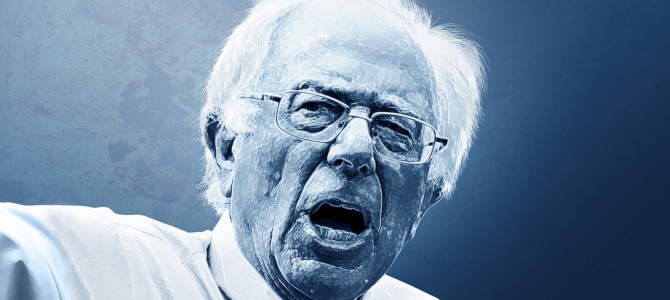
Bernie Sanders, the self-proclaimed “democratic socialist” senator from Vermont, sure sounds like a conservative on immigration. In an interview with Ezra Klein that appeared on Vox.com last week, Sanders called open borders a “Koch brothers proposal” that
would make everybody in America poorer —you’re doing away with the concept of a nation state, and I don’t think there’s any country in the world that believes in that. If you believe in a nation-state or in a country called the United States or UK or Denmark or any other country, you have an obligation in my view to do everything we can to help poor people. What right-wing people in this country would love is an open-border policy. Bring in all kinds of people, work for $2 or $3 an hour, that would be great for them. I don’t believe in that. I think we have to raise wages in this country, I think we have to do everything we can to create millions of jobs.
Sanders’ view on immigration—if sincere—would not only put him to the right of most liberals (and declared Democratic presidential candidates), but also to the right of libertarians and several Republican presidential candidates. Although Sanders isn’t the first on the American left to make an American labor-centric argument against increased immigration, focusing on its effects on low-wage labor, he also turns up surprisingly conservative in other areas.
Bernie Sanders, Right-Winger
Take the Export-Import Bank. This previously obscure federal agency has caused a civil war between the pro-market and pro-business wings of the Republican Party. If only all Republicans shared Sanders’ principled stance against the bank. Sanders has “long criticized the bank and voted against reauthorizing it last year,” according to The Hill.
Democratic socialist he might be, Sanders has no trouble opposing the use of government power to favor certain businesses over others. Sure, he probably would prefer to cut out the middleman by removing the businesses altogether, but it’s a start. On this issue, he could actually find common ground with Tea Party-style Republicans who agree with his conclusion, if not its underlying logic.
Finally, let’s look at his position on gun control. Although Sanders has recently stressed his support for some gun-control measures, such as universal background checks and outright bans on certain weapons, he has a surprisingly conservative gun record. As a congressman from Vermont, a state with a high rate of gun ownership, he voted against the 1993 Brady Act. As senator, “Sanders supported bills to allow firearms in checked bags on Amtrak trains and block funding to any foreign aid organization that registered or taxed Americans’ guns.” After Sandy Hook, Sanders said “if you passed the strongest gun control legislation tomorrow, I don’t think it will have a profound effect on the tragedies we have seen.” Slate’s Mark Joseph Stern recounted all of this disapprovingly in an article titled “Bernie Sanders, Gun Nut.”
A Principled Man in Unprincipled Times
True, even with these notable exceptions, Sanders is still a democratic socialist who believes that we have too many brands of spray-on underarm deodorant. But unlike certain candidates, Sanders actually believes in things other than himself. He’s not afraid to tell you what he thinks about the issues. He won’t sell himself to the highest bidder. And he tries to represent his constituents.
Compared to Hillary Clinton, who won’t reveal her position on the Keystone Pipeline until she’s elected, who makes millions a year giving speeches (and more in one than Sanders’ net worth), and who carpetbagged her way into a U.S. Senate seat from New York, Sanders might as well be Jefferson Smith, Jimmy Stewart’s virtuous character in “Mr. Smith Goes To Washington.”
Indeed, that Sanders has principles at all is the best argument for his presidential candidacy. For even though he holds views on free markets, central planning, and the wisdom of expertise far removed from many Republicans (and from reality), at least he holds them. His position on the Export-Import Bank—his opposition to which puts him just as far from conventional wisdom as its Republican opponents (even if from the other direction)—suggests that maybe Washington needs more principles and more clarity, not just bipartisanship and moderation.
As Tim Carney, a visiting fellow at the American Enterprise Institute where I work, has suggested, maybe some solutions to America’s problems will come when people outside our mushy, bipartisan, cronyist middle meet under the boat. So while Bernie Sanders may not be a conservative, he is the most principled Democrat running for president.









